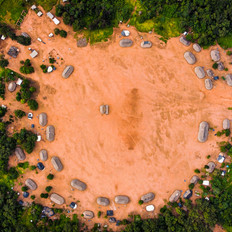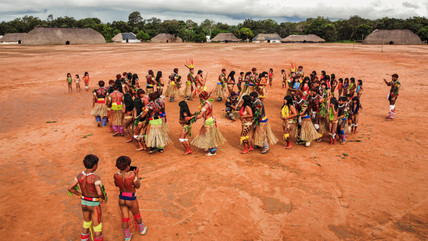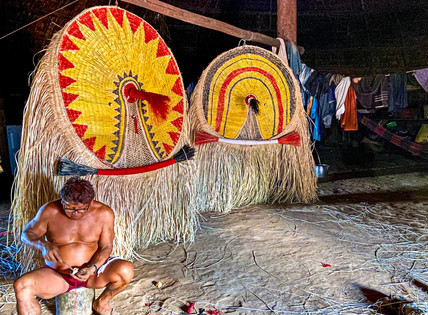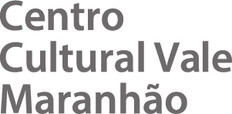
Exhibition
Origins of the World | Waurá
22 May to 27 July 2024
The Origins of the World exhibition program presents, at each edition, aspects of
culture of the original Brazilian peoples and communities, based on the understanding that
culture, in its broad aspect of the meaning of humanity, is generated from
established relationships between subjects, their territory, and the balance between everyday life and what
run away from him.

Os Waurá
The Waurá people, together with the Mehinako, Yawalapiti, Pareci and Enawene Nawe, are part of the group of Central Mairupe and are inhabitants of the Xingu Indigenous Park, in the southern Brazilian Amazon. They speak the Mairupe language, from the Arawak or Aruak language family. Archaeological research confirms that Aruak-speaking peoples have been present in the upper Xinguan territory for over a millennium. The pre-Cabral ceramic evidence found is, apparently, still produced today, in the same shapes as in the past: pots decorated with a turned edge, kisses, conical supports, and others.
According to Sesi/Sesai – Department of Indigenous Health – the Waurá population numbered 670 people in 2020, of which 270 inhabitants live near the lagoon that gives the village its name: Piyulaga, or Fishing Place.
Sources:
BARCELOS NETO, Aristotle. Notes on a Xinguan historical iconography. In: FRANCHETTO, Bruna; HECKENBERGER, Michael (Orgs.). The peoples of the Upper Xingu. Rio de Janeiro: UFRJ, 2001. p. 193-218.
Indigenous Peoples in Brazil. People: Waujá. Available at: https://pib.socioambiental.org/pt/Povo:Wauj%C3%A1#Fontes_de_informa.C3.A7.C3.A3o. Accessed on: May 14, 2024.
The Atuyuwa masks of the Apapaatai
Apapaatai are the numerous spirit beings that populate the territory and the shamanic cosmogony of Waurá, in the Brazilian Amazon of the Upper Xingu. These immortal beings have a time of their own. They belong to the original antiquity of humanity, when they shared the same space-time sphere with human beings. The Apapaatai spirits embody animals and natural elements that are part of the social universe of the Waurá. Dubious beings establish chaos, while at the same time promoting a cure for the ills they cause. The round masks recover and materialize, through their shape, the circular sense of the Waurá relationship with time and space, in its daily connection with things and beings. The circle is present in the demarcation of the territory, in the layout of the architecture, in the movements and meanings of rituals, in orality, in any instance that moves the life cycle.
Pirathá Waurá, a member and photographer from the Piyulaga village, tells us more about the masks and their use. He is the author of the images that present the landscapes of the Waurá people, in the context of this exhibition.
… rarely does this masking ceremony take place. So this masking ritual happened 20 years ago, in 2004.
The mask is produced through the eyes of shamanism. And that mask is the owner of a large tree. It’s actually an Atuyuwa mask. He’s a chieftain… one of the chief leaders of nature’s spirits.
So, when a person loses the desire to eat something, or has forgotten to eat, or is wanting to eat and couldn’t… then the spirit attacks, right? And hurting that person. And then the patient’s family seeks to consult the shaman. Then he looks, examines, smokes that big cigar. And it communicates with the spirit. Then she discovers that this mask, Atuyuwa, is hurting that person. From now on, there’s food in the center. The family takes and chooses the person who can present that spirit.
And after that, those chosen ones will introduce themselves to him, at the house where he is feeling sick. Then, then the patient, the patient, gets better. And to improve 100%, he has to make the mask. Then, when the process begins, it will feed people, so that the spirit will enjoy it a lot. Determine and make that presentation in the center of the village, go to the house and come back. Dance, that stuff… so that’s how it goes.
When this dance is over, (the mask) is kept in the center of the village. The village has a circular shape and there is a men’s house in the middle of the village. That’s where it’s stored.
Then, the person responsible, the one who produces, asked to take care, and takes the patient to the house, who had already been ill that day. And all that process, all that ceremony, dances, the spirits are cheerful and don’t harm the person anymore. But he became a protector of that person. And after that, he protects against other evil spirits.
So what is that? So, every mask that we do, this ritual that we do, is a… it’s a healing ritual, so to speak. And when you do that, it’s something like, when you get a vaccine, you get immunized, right? And for us, this mask is like that too. When you produce a mask for yourself, you are protected from other evils. So that’s the story of Atuyuwa. First he attacks, and then when he performs the ritual, he becomes his protector. It will protect you from other evils.
Pirathá Waurá
Telephone conversation, May 2024


Eduardo Bartolomeo (President)
Malu Paiva (Executive VP of Sustainability)
Alexandre D’Ambrosio (Executive VP of Corporate and Institutional Affairs)
Gustavo Pimenta (Executive VP of Finance and Investor Relations)
Carlos Medeiros (Executive VP of Operations)
Marina Quental (Executive VP of People)
Alexandre Pereira (Executive VP of Projects)
Marcello Spinelli (Executive VP of Iron Ore Solutions)
Rafael Bittar (VP Technical Executive)

STRATEGIC ADVICE
Malu Paiva (President)
Flávia Constant (Vice President)
Hugo Barreto
Octavio Bulcano
EXECUTIVE BOARD
Hugo Barreto (CEO)
Luciana Gondim
Gisela Rosa
PROJECTS AND SPONSORSHIPS
Marize Mattos
Team: Ana Beatriz Abreu; Barbara Alves; Elizabete Moreira; Eunice Silva; Fabianne Herrera; Flávia Dratovsky; Jessica Morais; Joana Martins; Luciana Vieira; Maristella Medeiros; Michelle Amorim; Neila Souza; Nihara Pereira; Renata Mello

Gabriel Gutierrez (Direction)
Deyla Rabelo (Steering Assistant)
Ubiratã Trindade (Educational Program Coordination)
Alcenilton Reis Junior; Amanda Everton and Maeleide Moraes Lopes (Educators)
Dianna Serra and Lyssia Santos (Educational Program Interns)
Edízio Moura (Communication Coordination)
Aiara Dália (Communication Assistance)
Nat Maciel (Production Coordination)
Fabio Pinheiro; Luty Barteix; Mayara Sucupira; Pablo Adriano Silva Santos and Samara Regina (Producers)
Ana Beatris Silva (Financial Coordination — In Account)
Tayane Inojosa (Financial)
Ana Célia Freitas Santos (Administrative)
Isabella Alves (Administrative Intern)
Adiel Lopes and Jaqueline Ponçadilha (Reception)
Fábio Rabelo; Kaciane Costa Marques and Luzineth Nascimento Rodrigues (Janitorial Office)
Yves Motta (General Maintenance Supervision); Francivaldo Santos and Jozenilson Leal (Maintenance)
Charles Rodrigues; Izaías Souza Silva; Raimundo Bastos and Raimundo Vilaça (Security)
ORIGINS OF THE WORLD | WAURÁ
Curatorship
Gabriel Gutierrez
Artistic Coordination
Deyla Rabelo
Gabriel Gutierrez
Expography
Gabriel Gutierrez
Texts
Gabriel Gutierrez
Piratá Wauja
Review
Edízio Moura
Lighting
Karine Spuri
Photographs
Piratá Wauja
Executive Production
Maria Silvestre, Marcelo Comparini (MC²)
production
Fábio Pinheiro
Luty Barteix
Mayara Sucupira
Nat Maciel
Pablo Adriano
Samara Regina
montage
Diones Caldas
Fábio Nunes Pereira
Marlyson Nunes
Rafael Vasconcelos
CENOTECHNICS
Painting
Daniel Almeida
Francivaldo Santos
Luciano Santos
Electric
Jozenilson Leal
joinery
Edson Diniz Moraes
José de Ribamar Pereira da Silva
Wilson Silva
Locksmitheria
José de Souza Cantanhede